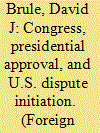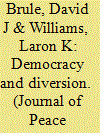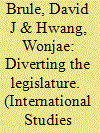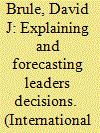|
|
|
Sort Order |
|
|
|
Items / Page
|
|
|
|
|
|
|
| Srl | Item |
| 1 |
ID:
084291


|
|
|
|
|
| Publication |
2008.
|
| Summary/Abstract |
Do presidents initiate disputes in response to low public approval ratings? Although research on the diversionary use of force finds links between poor economic conditions and military disputes, findings evaluating the effect of presidential approval ratings typically fail to support the diversionary hypothesis. But this research tends to neglect the role of presidential-congressional relations in the president's foreign policy making processes. This paper applies the policy availability argument to the puzzle: legislative constraints on presidential action during periods of low public approval compel the president to pursue alternatives that he can implement largely on his own in order to display his leadership skills-including the use of military force abroad. The argument is tested by examining the interactive effects of congressional support for the president and presidential approval ratings on the propensity to initiate militarized interstate disputes from 1949 to 2000. The results indicate that the president is more likely to use force in response to low presidential approval when faced with low congressional support.
|
|
|
|
|
|
|
|
|
|
|
|
|
|
|
|
| 2 |
ID:
093087


|
|
|
|
|
| Publication |
2009.
|
| Summary/Abstract |
Do legislative constraints constrain or compel democratic executives' conflict behavior during periods of economic decline? Although institutional constraints are thought to reduce democratic executives' propensity to engage in interstate conflict, other research suggests that such constraints may provide incentives to engage in diversionary uses of force. Incorporating work from the comparative study of economic voting and cross-national research on the diversionary use of force, this article contends that government arrangements - coalition, minority, weak party cohesion - influence democratic conflict behavior by (1) shaping the extent to which the executive is held accountable for the economy and (2) determining the executive's capacity to address the economy with legislation. Specifically, the argument presented here suggests that governing parties in coalition governments share the blame for a poor economy, reducing the likelihood that the executive initiates disputes in response to the economy. Compared to single-party majority governments with high party discipline, executives presiding over minority governments, or whose parties are plagued by a lack of cohesion, are more likely to initiate disputes when faced with poor economic conditions, because these executives are likely to face resistance to remedial economic policy. Probit analyses of the interactive effects of government arrangements and economic performance on dispute initiation among industrialized democracies, 1950-97, support the argument. The article concludes with implications for research in comparative politics and international relations, including, for example, executive-legislative relations and strategic conflict avoidance.
|
|
|
|
|
|
|
|
|
|
|
|
|
|
|
|
| 3 |
ID:
096689


|
|
|
|
|
| Publication |
2010.
|
| Summary/Abstract |
Given distinct partisan macroeconomic preferences, the partisanship of the president or majority in Congress should influence presidential decisions to use force in the face of poor economic conditions-the diversionary use of force. But previous research posits contradictory accounts of the influence of partisanship. We seek to resolve this debate by developing a game theory model, which predicts that leaders divert when government is divided and economic conditions hurt the opposition party's constituency. Leaders seek to divert the legislature from the economy in order to prevent the legislature from passing a remedial economic bill. Analyzing US conflict behavior since World War II, we examine the conditional influence of presidential partisanship and the president's cohesive partisan support in Congress on the effects of inflation and unemployment. Consistent with the model's predictions, we find that as their cohesive partisan support in Congress declines, Democratic presidents tend to use force in response to inflation and Republican presidents tend to use force in response to unemployment.
|
|
|
|
|
|
|
|
|
|
|
|
|
|
|
|
| 4 |
ID:
060825


|
|
|
|
|
|
|
|